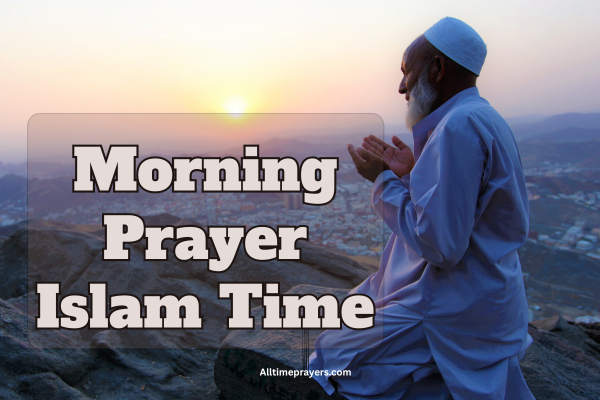Morning Prayer Islam Time will explore the best praying time in islam, that is best practice globally and that can Invite God for the start of the day. This Morning Prayer Islam Time is specially packed of morning prayers especially in islam time.
In the stillness before sunrise, when the world is wrapped in silence, the call of the muezzin pierces the air: “As-salatu khayrun min an-nawm” “Prayer is better than sleep.” This call, recited during the Fajr Adhan (morning prayer call), reminds Muslims that the dawn hour is not meant for slumber, but for remembrance of the Creator.
The Morning Prayer Islam Time, also known as Salat al-Fajr, is more than a ritual; it’s a divine appointment, a sacred meeting between the believer and Allah. Performed at dawn, Fajr is the foundation of a successful day and a peaceful heart. The Prophet Muhammad (peace be upon him) said:
“The most beloved of prayers to Allah is the prayer of Dawud, and the most beloved of fasting to Allah is the fasting of Dawud. He used to sleep half the night, pray for one-third of it, and sleep for one-sixth of it.”
(Sahih al-Bukhari 1131)
This rhythm of sleep, prayer, and renewal reflects how Islam integrates spiritual devotion with human well-being. Morning prayer sets the tone for productivity, protection, and divine connection.
Understanding the Morning Prayer in Islam (Salat al-Fajr)

The Meaning of Fajr
The Arabic word Fajr means “dawn” or “the breaking of light.” Symbolically, it represents awakening, a transition from darkness to illumination, ignorance to knowledge, heedlessness to remembrance.
Fajr prayer consists of two Sunnah rak’ahs (highly recommended) and two obligatory rak’ahs (Fard). Despite its brevity, its spiritual weight is immense.
“Indeed, the recitation of dawn is ever witnessed.”
(Surah Al-Isra 17:78)
The angels of the night and the angels of the day both witness the Fajr prayer. This makes it an extraordinary moment of divine attention.
Morning Prayer Islam Time – The Exact Duration
Fajr Prayer Time Frame
- Starts: At true dawn (Fajr al-Sadiq) when the first light spreads horizontally across the horizon.
- Ends: Just before sunrise.
Muslims must complete the prayer before the first rays of the sun appear. The Prophet (peace be upon him) said:
“Whoever catches one rak’ah of Fajr before sunrise has caught the prayer.”
(Sahih al-Bukhari 579)
Best Time to Perform It
While the entire dawn period is valid, it is most virtuous to pray at the beginning of Fajr time. This demonstrates eagerness and obedience, aligning one’s heart with Allah’s call.
“Indeed, prayer has been decreed upon the believers a decree of specified times.”
(Surah An-Nisa 4:103)
The Spiritual and Physical Benefits of Morning Prayer
The early hours hold unmatched spiritual energy. The Prophet (peace be upon him) prayed:
“O Allah, bless my nation in their early mornings.”
(Sunan Ibn Majah 2236)
1. Spiritual Protection
Fajr creates a divine shield against harm. The Prophet said:
“Whoever prays the morning prayer is under the protection of Allah.”
(Sahih Muslim 657)
2. Emotional Clarity
Praying at dawn nurtures tranquility and focus. Scientific studies even show that early rising improves concentration and mood — aligning perfectly with Islamic teachings.
3. Barakah in Time and Provision
When one begins the day in worship, Allah places barakah (blessing) in their time, energy, and sustenance.
4. A Light in the Hereafter
“Give glad tidings to those who walk to the mosque in darkness that they will have perfect light on the Day of Judgment.”
(Sunan Abu Dawood 561)
Step-by-Step Guide to Performing Fajr Prayer

1. Intention (Niyyah)
Silently make intention:
“I intend to perform two rak’ahs Sunnah of Fajr for Allah, facing the Qibla.”
2. Two Rak’ahs Sunnah
Recite quietly. Recommended surahs:
- 1st Rak’ah: Surah Al-Kafirun (109)
- 2nd Rak’ah: Surah Al-Ikhlas (112)
3. Two Rak’ahs Fard
Obligatory and recited aloud.
Recommended:
- 1st Rak’ah: Surah Al-Fatiha + Surah Al-Kafirun
- 2nd Rak’ah: Surah Al-Fatiha + Surah Al-Ikhlas
4. After Fajr Sit for Dhikr
Remain seated to recite dhikr and dua until sunrise. This was a practice of the Prophet (peace be upon him).
Morning Duas and Dhikr After Fajr Prayer
Dua Upon Waking Up
Alhamdulillahil-lathee ahyana ba’da ma amatana wa ilayhin-nushoor.
“All praise is due to Allah who gave us life after causing us to die, and to Him is the resurrection.” (Bukhari 6312)
Dua for Light and Guidance
Allahumma ij‘al fi qalbi nuran, wa fi lisani nuran, wa fi sam‘i nuran, wa fi basari nuran…
“O Allah, place light in my heart, my tongue, my hearing, and my sight…”
Dua for Sustenance
Allahumma inni as’aluka rizqan tayyiban, wa ‘amalan mutaqabbalan.
“O Allah, I ask You for pure provision and accepted deeds.”
Dua for Protection
Bismillahilladhi la yadurru ma‘a ismihi shay’un fil-ardi wa la fis-sama’i wa huwa as-sami‘ul-‘alim.
“In the Name of Allah, with whose Name nothing can harm on earth or in the heavens, and He is the All-Hearing, All-Knowing.”
Morning Adhkar (Remembrances) from Sunnah
Recite the following:
- Ayat al-Kursi (Surah 2:255)
- Surah Al-Ikhlas, Al-Falaq, and An-Nas – three times each
- 100x “SubhanAllah wa bihamdihi”
- 100x “Astaghfirullah”
- La ilaha illa Allah, wahdahu la sharika lahu…” – brings protection and reward.
This dhikr purifies the heart, strengthens faith, and invites angelic presence.
The Power of Early Morning, A Time of Barakah

1. Prophet’s Example
The Prophet (peace be upon him) valued the dawn hours so deeply that he would stay awake in remembrance after Fajr until sunrise.
2. Scientific Confirmation
Modern science shows that early risers experience greater productivity, better mental health, and more stable energy levels. Islam’s emphasis on morning prayer aligns with natural human rhythm — what the Prophet called fitrah.
3. Blessings in Livelihood
Those who start their day with remembrance often testify that work becomes easier and success more consistent. Fajr trains believers in discipline, a trait linked with both spiritual and worldly prosperity.
Real-Life Testimonies, How Fajr Changed Lives
Fatima’s Journey: From Anxiety to Inner Peace
“I was struggling with anxiety. My counselor advised meditation, but I turned to Fajr instead. Waking up before dawn, reciting dua, and sitting in silence transformed my mornings. I began feeling calm and hopeful.”
Ahmed’s Story: Business Growth Through Barakah
“As a small business owner, I always felt rushed. But after committing to Fajr, I noticed my time expanded. Clients came unexpectedly. My productivity doubled. I realized Fajr is not a loss of sleep but a gain in success.”
Zainab’s Renewal: Healing Through Prayer
“After my mother’s passing, Fajr became my anchor. I would cry to Allah each dawn, and through those prayers, my grief softened. Now, every morning feels like a message of mercy.”
Bilal’s Transformation: Overcoming Laziness
“I used to stay up late and sleep through Fajr. My days felt empty. Once I began praying at dawn, my motivation returned. Now I wake early, study, and feel spiritually alive.”
These testimonies remind us that Morning Prayer Islam Time is not just about obedience, it’s about awakening to purpose.
Frequently Asked Questions
Q1: What if I miss Fajr prayer?
If one oversleeps unintentionally, pray immediately upon waking. The Prophet said:
“Whoever forgets a prayer or sleeps and misses it, let him pray it when he remembers.” (Muslim 684)
Q2: Can Fajr be prayed at home?
Yes. It can be prayed at home individually, but praying in congregation (for men) in the mosque carries greater reward.
Q3: What time is Fajr in different regions?
You can check your local Islamic prayer timetable or apps like Muslim Pro or IslamicFinder for exact dawn times in your city.
Q4: How long before sunrise does Fajr end?
Approximately 15–20 minutes before sunrise, though this varies by location.
Section 10: Daily Morning Routine for a Believer
- Wake up before dawn (Tahajjud if possible).
- Perform Wudu (ablution) mindfully.
- Recite Waking Dua.
- Pray Sunnah, then Fard of Fajr.
- Make Dhikr until sunrise.
- Recite a portion of the Quran (e.g., Surah Yaseen).
- Make dua for guidance, family, and livelihood.
- Begin work or study with “Bismillah.”
Similar Prayer For You
More Suggested Prayers:
- Morning Prayers for Strength – Strengthen your spirit each day.
- Inspirational Good Morning Prayers – Start your day with faith-filled reflection.
- 25 Early Morning Prayer Points – Focused prayers to open your day with victory.
- IslamicFinder Prayer Times – Check accurate Fajr time by location.
- Quran.com – Access authentic Quranic verses and translations.
- Sunnah.com – Explore Hadiths about Fajr and daily dhikr.
Final Reflection – The Reward of the Dawn Worshipper
When the Prophet (peace be upon him) described the people of Fajr, he said:
“Whoever prays Fajr in congregation, then sits remembering Allah until the sun rises, then prays two rak’ahs, will have the reward of Hajj and Umrah.”
(Tirmidhi 586)
Imagine, a simple act of consistency equals the reward of pilgrimage. That’s the magnitude of dawn worship.
Fajr teaches submission before action, remembrance before ambition, and gratitude before consumption. It centers the believer’s heart before stepping into the noise of the world.
Conclusion: Rise with the Light of Faith
Every morning, Allah renews His mercy upon creation. The Morning Prayer Islam Time is your doorway to that mercy, a sacred routine that transforms ordinary life into a life of purpose. To rise for Fajr is to rise for success, both in this world and the next.
Let your mornings begin not with worry, but with worship. For those who start their day with Allah, no darkness can overcome them.






